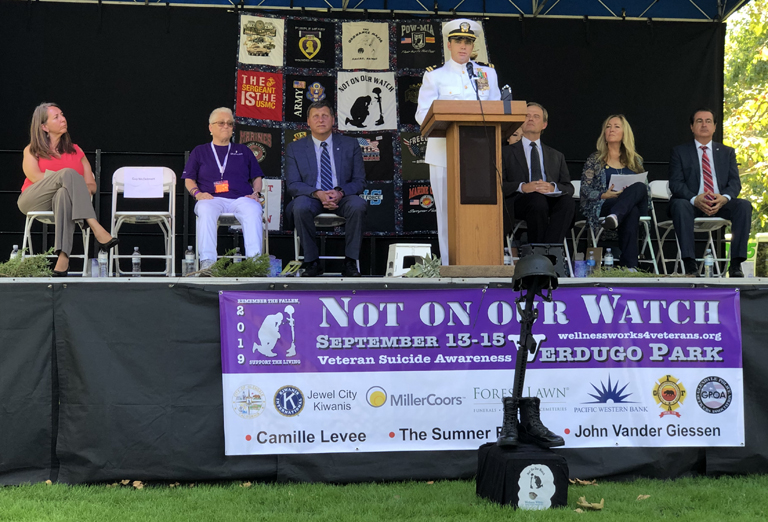
Listening to Guy McDermott speak are, from left, Rev. Cassie McCarty, Dignity Health, Kathy Lynch MFT, Wellness Works, Ara Najarian, Bill Jones, Lisa Raggio and Vartan Gharpetian.
By Ani GASPARYAN
Veterans and supporters were seen patrolling Cañada Boulverad for three days and two nights to bring attention to the high number of veterans who commit suicide every day in the United States.
Not On My Watch, a three-day vigil to raise awareness about veteran suicide, had its opening ceremony on Friday afternoon, Sept. 13. The event was hosted at Verdugo Park by Wellness Works, a nonprofit that provides resources for veterans, active military members and their families.
A variety of speakers, including veterans and local politicians, spoke on the importance of supporting veterans and their mental health. Guy McDermott, a Glendale firefighter paramedic and retired Navy SEAL, said in his speech that many veterans returned from war with severe mental and physical ailments.
“In reflection of what I’ve experienced and seen (with) the sheer number of veterans who are committing suicide,” he said, “I don’t think that we have a problem, people, I think we have a crisis on our hands.”
According to the U.S. Dept. of Veteran Affairs’ 2012 National Suicide Data Report, 22 veterans commit suicide every day due to post traumatic stress disorder. In its 2016 report, the rate of suicide was said to be 1.4 times higher among male veterans and 1.8 times higher for female veterans compared to non-veterans. Of these deaths, 69% of them were the result of a firearm injury.
Manual Martinez, director of the East Los Angeles Veteran Center, said that veterans are more successful at completing suicide compared to the average population because of their access to weapons.
“I think it’s very important that people become conscious that there’s 22 veterans who commit suicide a day,” he said. “I think the more people are aware of it, the more they’re going to be on the alert for those signs that somebody in their household or a friend is thinking about it.”
After the opening ceremony, veterans and supporters were invited to walk along a guided route on Cañada Boulevard while wearing ceremonial dog tags like the ones worn by soldiers. The exercise was meant to replicate how soldiers “stand watch” during their military service. Participants did this in shifts for three days and two nights.
Camille Levee, one of the organizers of the event and the widow of a veteran, said that sometimes people forget how hard it can be to transition back to everyday life after being a soldier.
“It’s important for the community to be aware that this is not just a veterans’ problem,” she said, “It’s all our problems, and only by working together can we eliminate the crisis.”
Lisa Raggio, executive director of Wellness Works, said that the loss of veterans’ lives makes a huge dent in local communities.
“The government invests a lot of money and time into developing leadership in our veterans and for them to return and encounter post deployment alienation and suffer from post traumatic stress is a threat to the value that they can add to communities,” she said.
Wellness Works offers free services to veterans to help them transition back into society, including mental health therapy, relaxation classes and more. The VA also established a toll-free, confidential veterans crisis line that allows veterans to speak with mental health professionals at any hour or day of the week.
“If we save one [veteran’s] life today,
that means we won one battle. If we win one battle, we can win two and if we won two, we can win three,” McDermott said. “And we
keep on going until we’ve won all the battles and we save all of them.”
